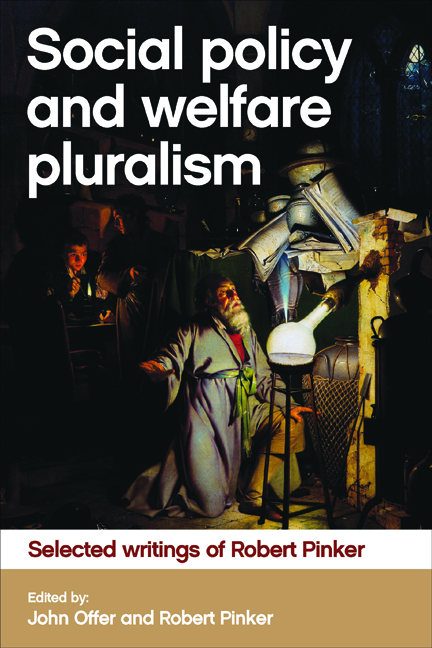Book contents
- Frontmatter
- Contents
- Acknowledgement
- Preface
- General introduction: Robert Pinker on rethinking approaches to welfare
- Introduction to Part One On social policy studies
- one The ends and means of social policy: a personal and generational perspective
- two Social theory and social policy: a challenging relationship
- three Stigma and social welfare
- four The welfare state: a comparative perspective
- five Richard Titmuss and the making of British social policy studies after the Second World War: a reappraisal
- Introduction to Part Two On social care, communities and the conditions for well-being
- six Report of the Working Party on the Role and Tasks of Social Workers: an alternative view
- seven The quest for community: from the Settlement Movement to the Griffiths Report: an historical perspective
- eight Citizenship, civil war and welfare: the making of modern Ireland
- Introduction to Part Three On welfare pluralism
- nine Golden Ages and welfare alchemists
- ten From gift relationships to quasi-markets: an odyssey along the policy paths of altruism and egoism
- eleven The experience of citizenship: a generational perspective
- twelve The right to welfare
- thirteen The prospects for social policy in the UK after the 2015 General Election
- Afterword On the post-Brexit prospects for social policy in the UK
- References
- Index
seven - The quest for community: from the Settlement Movement to the Griffiths Report: an historical perspective
Published online by Cambridge University Press: 08 April 2022
- Frontmatter
- Contents
- Acknowledgement
- Preface
- General introduction: Robert Pinker on rethinking approaches to welfare
- Introduction to Part One On social policy studies
- one The ends and means of social policy: a personal and generational perspective
- two Social theory and social policy: a challenging relationship
- three Stigma and social welfare
- four The welfare state: a comparative perspective
- five Richard Titmuss and the making of British social policy studies after the Second World War: a reappraisal
- Introduction to Part Two On social care, communities and the conditions for well-being
- six Report of the Working Party on the Role and Tasks of Social Workers: an alternative view
- seven The quest for community: from the Settlement Movement to the Griffiths Report: an historical perspective
- eight Citizenship, civil war and welfare: the making of modern Ireland
- Introduction to Part Three On welfare pluralism
- nine Golden Ages and welfare alchemists
- ten From gift relationships to quasi-markets: an odyssey along the policy paths of altruism and egoism
- eleven The experience of citizenship: a generational perspective
- twelve The right to welfare
- thirteen The prospects for social policy in the UK after the 2015 General Election
- Afterword On the post-Brexit prospects for social policy in the UK
- References
- Index
Summary
The history of British social welfare primarily concerns the interplay of formal welfare bureaucracy and informal networks of care based on families, neighbourhoods and communities and its effects on the relationship between the state and civil society. In order to appreciate the current vogue for welfare pluralism it is helpful to look back over this process as it unfolded. The record might have been very different, for example, if the British welfare state established before the First World War had been designed for individualist rather than collectivist purposes.
The quest for community – the desire to restore a vanishing way of life rooted in traditional loyalties and obligations and perpetuated by self-reliant citizens – has been one of the sustaining myths of politicians and social scientists since the beginning of the industrial revolution. Commitment to this ideal has not lessened as the proportion of the population living in complex industrial urban localities has grown larger. On the whole the quest for community has been conducted by middle-class social reformers on behalf of urban working-class people, regardless of whether these people have expressed any awareness of cultural deprivation, let alone a vanished heritage.
Rediscovery of the community ideal was the inspiration of the English Settlement Movement, which emerged in the 1880s. The sponsors of the movement included Samuel and Henrietta Barnett, Octavia Hill and Edward Denison and Oxford academics like Benjamin Jowett, T.H. Green and Arnold Toynbee. With varying degrees of intensity they held common objectives and shared the same anxiety about the growing powers of the state and they supported the new poor law principle of less eligibility and the workhouse test. Edward Denison was also a founder member of the Charity Organisation Society, which was subsequently taken over by the social reformers C.S. Loch and Bernard and Helen Bosanquet. The Society's pronouncements on the debilitating nature of state intervention in the relief of need are echoed today in the oratory of politicians like Lord Young and John Moore on the role of state welfare in the creation of a culture of dependency among the poor.
- Type
- Chapter
- Information
- Social Policy and Welfare PluralismSelected Writings of Robert Pinker, pp. 147 - 170Publisher: Bristol University PressPrint publication year: 2017



